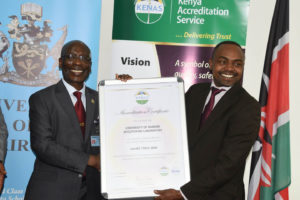Texas A&M AgriLife facilitates accreditation of University of Nairobi Mycotoxin Laboratory
Media contact: Blair Fannin, 979-845-2259, [email protected]
Contact: Dr. Tim Herrman, 979-845-1121,[email protected]
COLLEGE STATION – Texas A&M AgriLife Research and the Office of the Texas State Chemist’s role in building a global food safety network to combat aflatoxin poisoning has taken another step forward with its recent accreditation of the University of Nairobi Mycotoxin Laboratory.
The mission to combat aflatoxin risk includes assisting laboratories worldwide in their pursuit of ISO. This most recent accreditation was celebrated May 21 at the University of Nairobi with the presentation of an ISO 17025:2005 certificate by the Kenya Accreditation Service.

Dr. Tim Herrman, Texas State Chemist, was part of a team led by Dr. Sheila Okoth from the College of Biological and Physical Sciences at the University of Nairobi, and Martin Chesire, CEO, KENAS – Kenya Accreditation Service, and Dr. Julius Ogeng’o, University of Nairobi deputy vice-chancellor of academic affairs.
“Accreditation is one of the key things a world-class university should have,” Ogeng’o said. “This lab encompasses three things that are key to a world-class university. There are university-industry linkages, it addresses food security, which is a key issue in the Big 4 agenda, and it is an initiative that provides solutions to society.”
The Office of the Texas State Chemist initiated its global aflatoxin risk management program in 2014, patterned after its regulatory risk management model developed in Texas.
“We started our global outreach effort at the International Livestock Research Institute (ILRI) Nairobi campus to test the hypothesis regarding the universality of a quality system’s approach to manage aflatoxin risk,” Herrman said.
“The initial effort began by establishing the first aflatoxin ISO accredited laboratory by the Kenya Accreditation Service on the ILRI campus and working with the Cereal Millers Association members in their adoption of a quality system’s approach to measure and manage aflatoxin risk.”
The program quickly expanded globally through collaboration with the Food and Agriculture Organization of the United Nations with the addition of aflatoxin proficiency testing and other international partners.
This program currently involves over 200 participating laboratories in 62 countries, including the one most recently accredited at the University of Nairobi.
“One major issue in Kenya is the high rate of deaths as a result of aflatoxin poisoning,” Okoth said. “Through the tests carried out in our lab, we are seeking to prevent aflatoxin poisoning. This accreditation is one that is credible, and it comes at a good time when we need to ensure that everything that is consumed is safe.”
Laboratory quality systems is one of the five pillars used to manage aflatoxin risk introduced by the Office of the Texas State Chemist.
“The Aflatoxin Risk Management Program takes a comprehensive approach working with governments and industry (public-private) partners, including the development of codes of practice and action plans that may be translated into laws, rules and standards,” Herrman said.
“We encourage use of a shared-governance approach, also referred to as co-regulation, where there are shared responsibilities and mutual benefits. Most significantly, it expands the oversight of firms’ risk management programs and extends to the consumer food safety at an affordable cost through creation of a connected and transparent marketplace.
“Economic analysis of this approach in Texas reveals the cost-benefit of this form of regulation creates significant value to all market participants while expanding our regulatory oversight 30 to 40 fold,” Herrman said.
Continued work in Kenya involves a number of strategic partners at the county, national and international level.
“While the ultimate solution to plant pathogen–related problems such as aflatoxin involves development of resistance, this has been difficult,” Herrman said. “During the interim, our work in Texas, the U.S.and abroad will help ensure food and feed safety impacted by mycotoxins in a world where markets and movement of food is an international enterprise.”


